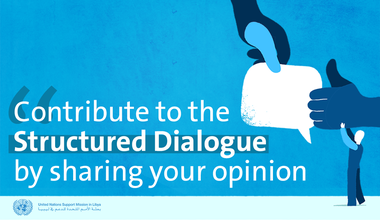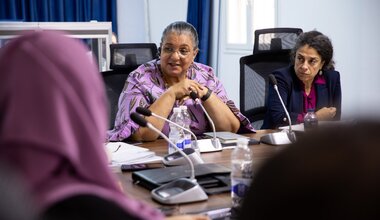A/SRSG Stephanie Williams opening remarks at the first session of the Libyan Political Dialogue Forum in Tunis - 9 November 2020
Your excellency the President of the Republic of Tunisia Qais Said
I would like to thank His Excellency, the President of the Tunisian Republic, for his kind remarks here today, and for the hospitality of the Tunisian people and authorities during this challenging period.
I also wish to thank the Governments of Germany, Italy, the United Kingdom and the United States, as well as the European Union for their generous support.
I am speaking to you at a time of rare optimism. After 18 months of war, and many years of crisis, I believe there is finally a glimmer of hope…
I have just come from Ghadames, where we held a successful round of military talks, further reinforcing the ceasefire that was agreed to several weeks ago.
That these all-important military talks could take place on Libyan soil, in the beautiful and historic city where we had hoped to convene the National Conference before the drums of war drowned out those voices calling for dialogue and reconciliation, is heartening. Every day cooperation is increasing, and the transformation of the 5+5 into the “group of 10” is more than just a slogan; it is a reality.
And witnessing this assembly before me today is heartening. An assembly which brings you together to reflect the will of the Libyan people.
I praise you for your courage, determination and steadfastness in representing your constituencies and the public good.
All of you have signed a pledge to recuse yourselves from executive positions. You are united by your common bond to work wholeheartedly towards ending the current crisis, in a spirit of fraternity and solidarity.
To work together to reach compromises for the sake of Libya and the Libyan people, in pursuit of their wishes. To bring unity where there was division, and harmony where there has been discord.
In these talks here today we are completing the work that began over three years ago under former SRSG Dr Ghassan Salamé, with talks between the House of Representatives and the High Council of State here in Tunis.
Since then we have convened round after round of dialogue, spending thousands of hours in person and on the phone with Libyan interlocutors and international players trying to prevent violence and find solutions.
We have held consultations across the country in every location from the largest cities to the smallest towns as part of the National Conference Process.
I would like to thank those States who have set aside their differences to aid us in the pursuit of peace. We saw this culminate in the Berlin Conference in January.
And we saw the UN Security Council endorse the conclusions of this conference in Resolution 2510 (2020), which serves as the foundation of this meeting, and the mandate for our work here.
The roadmap which we will outline today is the fruit of all these consultations. What we have consistently heard from these dialogues is that the current situation cannot continue. The Libyan people are tired of fighting, instability and putting their lives on hold.
They are tired of electricity cuts and queuing for fuel; of being unable to visit friends and families on the other side of the country; of having to travel abroad to vaccinate their babies.
Those displaced want to go home; the children want to finish their education; the fighters want to put down their guns and never to have to pick them up again.
After these extensive consultations, and from all our past efforts, we have heard a clear call from Libyans of what they expect from us here today.
They want us to end the violence and hostility between fellow citizens who are naturally united.
They want us to come out of this dialogue with unified institutions, ending this absurd and wasteful division of Libyan sovereign offices.
They want these institutions to guarantee their safety, provide basic goods and services, and allow them to lead dignified lives.
And most of all, they want democratic elections, where women and men throughout the country can freely choose a future for themselves, and for their children.
The Libyan people collectively have a vision for pulling Libya out of this crisis. This vision, which we will present to you today, is the basis of a National Political Program.
It is not an agenda from a foreign party, but rather a gift that you today can give to your fellow citizens.
It ends with democratic elections to finish the seemingly interminable transition and it begins with the creation of a new and unified executive to lead the way to these elections.
In validating this National Political Program you will together start to rebuild the trust among Libyans.
The overriding aim of the National Political Program is to renew political legitimacy by holding national elections, within an agreed timeframe. There will be no more delays.
In order to achieve this aim, the executive authority that will govern Libya in the run-up to the elections must be restructured.
The new government will be tasked with putting in place the necessary conditions for these elections to take place. It will also seek to launch national reconciliation, combat corruption, and restore public services.
Women must form a core part of this government, and not in a purely symbolic way. Women should be represented in leadership positions of sovereign ministries, and the security, defense and financial administrations.
Its progress will be monitored; its work will be reviewed on a regular basis through mechanisms that can hold it to account.
We are here with you to chart a course towards renewed institutions imbued with legitimacy, and representative of the people.
You are here to take a determined and irreversible step towards democratic elections in the coming months that will unite the country and restore Libya to full sovereignty. We are here to give Libya back to the Libyans.
The international community and, more importantly the Libyan people have put their trust in you.
Let’s not disappoint them, for they have been disappointed enough.
They have been disappointed in the failure of previous efforts to solve the crisis, and they have been disappointed by the self-interested actions of some in the Libyan political class, who have failed to unite the country behind them.
The LPDF will not resolve all of Libya’s problems, but if we fail to solve any of them, future resolution becomes impossible.
We must be guided by the principles of inclusivity, transparency, efficiency, pluralism, collegiality, and patriotism.
You must talk;
You must unite;
You must reconcile;
You must participate;
You must agree;
We must take a step forward.
Thank you.
 United Nations Peacekeeping
United Nations Peacekeeping UN
UN









